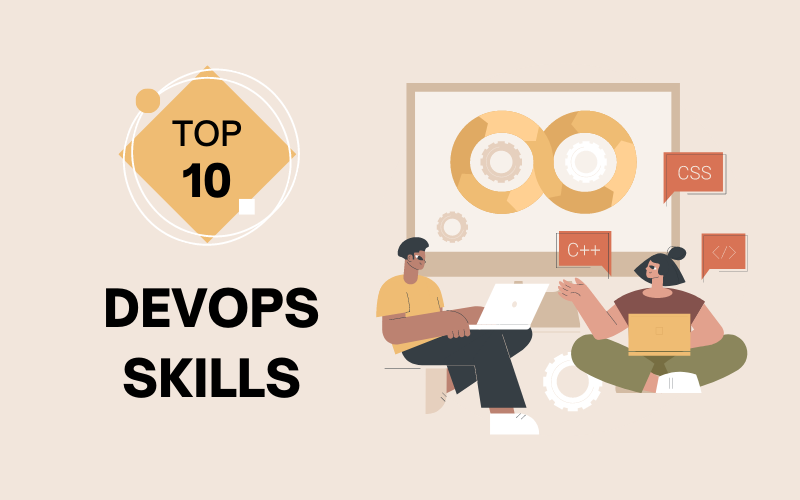Top 10 Essential Skills for DevOps Engineer


Most firms have begun to adopting DevOps practice, making DevOps Engineer one of the most sought-after professions in the IT field today and DevOps engineer salary very excellent. So, what are the DevOps engineer skills that companies seek? Let’s go through the 10 essential DevOps skills employers are looking for.
What is DevOps Engineer?
DevOps engineers collaborate with software developers as well as IT professionals to monitor the release of code. They have multiple roles, including software development, deployment, network operations, and system administrators. Collaboration is the foundation of DevOps practices, and the process’s overall success depends on that.
Therefore, DevOps engineers must understand various concepts like serverless computing, version control, integration, testing and deployment.
The job of a DevOps engineer arises due to companies needing to access their cloud infrastructure in the form of a hybrid. Businesses that use DevOps have a shorter time managing configurations, deploying apps, or making tweaks or changes.
Read more: Top 10 DevOps Trends to Watch 2022
DevOps Engineer Roles and Responsibilities
As a DevOps engineer, your employer will expect you to understand how the complete development process for software works. You’ll also have to know which stage of the development cycle you’ll be required to play an important part.
This is why your DevOps abilities should focus on automating manual processes. Pipelines are a great tool within the CI/CD process to help achieve this and improve efficiency. Also, you’ll need to keep up-to-date with release and deployment management.
Once you’ve been deployed, you’ll need to be able to keep an eye on the application, looking for any unusual behavior. At this point, the ability to communicate is essential because you’ll be working in teams throughout the company. If you can master efficient communication between teams, giving clearer and concise messages will be easier. You’ll also be able to comprehend the needs of your team and what they want to know. Communication is the most crucial skill that you need to master.
Let’s dive into the five essential technical abilities you’ll need to complete DevOps tasks. We’ll introduce the DevOps foundation, the platform you’ll have to be familiar with to use.
Read more: The DevOps RoadMap for Developers in 2022
Technical Skills
In-Depth Knowledge of Popular Platforms
A majority of businesses use the system known as platform as a service (PaaS) to automate tasks. The most used platforms to manage cloud computing include AWS and Azure DevOps. However, AWS ranks #1. The two platforms can be self-contained in numerous aspects, allowing you to access everything you require from them without needing to install other programs.
You must be aware of one at least to be a better DevOps engineer. Amazon and Microsoft provide classes and certifications that you can take advantage of to enhance your skills. Even though the basic platforms are essential, the DevOps role’s absolute foundation is knowing Linux and PowerShell scripting. We’ll talk about that in the next section.
Command Strong Linux and PowerShell Knowledge
Businesses are increasingly using Linux to host their IT infrastructure systems. This is why it’s increasingly essential to master what’s on the Linux commands. Also, you’ll need to learn how to use all kinds of commands and navigate through the file structure.
For the Microsoft shops, it is necessary to be familiar with Powershell. However, the best feature of PowerShell is that it integrates the same commands you know and are familiar with from Linux. Additionally, PowerShell adds in its cmdlets and function piping to provide a powerful experience.
Writing scripts is essential for the DevOps engineer position, and you’ll have to write scripts that automate manual processes and increase execution and efficiency. In terms of coding, scripts are your best companion.
Read more: Top 30 Most Effective DevOps Tools for 2022
Acquire Pipeline and Infrastructure Skills
Knowledge about pipelines for CI/CD process is vital. Most of the work you’re responsible for is building and maintaining pipelines. These automatic processes elevate code from one environment to the next while you build features for your applications. AWS and Azure have pipeline functions built into their platforms. You’ll also find several other apps that provide CI/CD processes, such as GitHub, GitLab, Jenkins, etc.., that you can integrate with your existing systems.
To create pipelines that are CI/CD, you’ll have to be able to utilize YAML to create your pipelines. In some instances, however, similar to Azure DevOps, you’ll see classic pipelines which use a GUI. They also operate using a drag-and-drop basis to build automated pipelines. However, you don’t have to code pipelines and have an infrastructure.
Following is the list of the most critical tools for CI/CD that are essential to DevOps engineers.
Top 10 CI/CD Tools for 2022
Master Infrastructure as a Code (IaaC) Tools
IaaC is now the preferred tool for creating cloud-based infrastructure and on-prem infrastructures, such as databases, virtual machines, and more. Terraform of HashiCorp is among the most popular programs for doing this.
Terraform lets you create code that specifies the kinds of resources you want to build and later launch them using AWS, Azure, and other platforms. You can reuse the code and store it as a template.This lets you achieve greater shareability.
Terraform has a unique state that allows you to keep track of your resources during releases and deployments. IaaC’s advantages include a changeless infrastructure, speed of delivery, cost control, and risk management.
The following IaaC tools are crucial for every DevOps engineer to have on hand. Being familiar with the entire list is unnecessary, but having one or two is crucial for your knowledge and future career development.
The Top 10 IaaC Tools for 2022
- Terraform
- Ansible
- AWS CloudFormation
- Azure Resource Management (ARM)
- Google Cloud Deployment Manager
- Chef
- Puppet
- SaltStack
- (R)?ex
- Vagrant
Communication Skills to be Integrated with QA
Many DevOps teams are focused on processes for CI/CD, including the management of releases, server migrations, and much more. However, it’s crucial to integrate with QA teams to develop QA solutions and incorporate these into your automated pipelines.
If your business strides toward DevOps integration, you’ll require abilities to integrate and communicate with QA teams earlier. Also, you should ensure that any existing testing frameworks can integrate well into the DevOps process.
Be aware that no QA process can be 100 100% automated. This is why, during your DevOps framework development process, you’ll need to use your expertise to build manual testing in your framework. This is because not all users will follow the designated testing paths. Your communication skills will assist in working with QA.

Non-Technical Skills
- Communication and Collaboration
- Decision Making
- Soft Skills
- Passion For Learning
- Proactiveness
Communication and Collaboration
Due to its vital nature, communication and collaboration are essential to winning the DevOps battle. They are crucial to breaking down the siloes among Dev and Ops teams, aligning the teams’ goals to the business goals, and implementing a DevOps culture across the entire organization.
Decision Making
Decision-making for many different options in the technological environments is very important, it is similar for DevOps engineers, too. If you’re aspiring to become a DevOps expert and for whom the businesses will be paying large paychecks in addition to technical abilities, you need to make quick decisions.
Your peers create the majority of code, and you need the ability to accept or refuse coding snippets that are in the process to boost the efficiency of your work. The faster process of rollout help you can tackle many projects and also achieve the maximum satisfaction of your customers.
Soft Skills
Unsurprisingly, the technical aspect will be commonplace when you are the top DevOps engineer. The only thing that could distinguish you from other candidates is the number of soft skills you have. You must be flexible, understanding, and cooperative in working with customers.
Another important aspect is to be open to customers’ comments and not impose your line of thought.
The competitive nature of the business environment has forced companies to embrace an agile method of developing methodologies, and DevOps is an integral part of that. It must require efficient communication and a solid soft skills foundation.
Passion For Learning
A passion for learning can get you through difficult competitors. The more you learn, the better you become. Being a lead engineer, you should be aware of innovative tools that can automate the development process in the field of DevOps.
Proactiveness
In general, DevOps engineers should be active and enthusiastic about their work. This is directly related to their performance and efficiency. Additionally, keeping up-to-date with the latest technologies, tools, and much more is essential to your work.
Other capabilities that can boost the DevOps engineering career include:
- Software development, systems administration, and the ability to comprehend all fundamental IT operations.
- Experience and knowledge of tools like GitHub, Puppet, Jenkins Chef Nagios, Ansible, and Docker.
- In addition to knowing tools off the shelf, a DevOps engineer must know the most basic programming and scripting languages like Bash, PowerShell, C#, C++, Python, PHP, Ruby, Java, and many more.
- A thorough understanding of database systems, such as SQL and NoSQL databases model.
- Communication and interpersonal skills are crucial for the DevOps engineer, as they need to ensure that the whole team behind the software operates efficiently and shares and appreciates feedback to ensure continuous delivery.
Final Thoughts
DevOps is merely a culture more than a technology solution. As you learn more about it, the better your profits. To succeed in the DevOps journey, whether as a professional, a company, or a service provider, you must be willing to adapt and be flexible in your operations and a combination of soft and hard skills.
